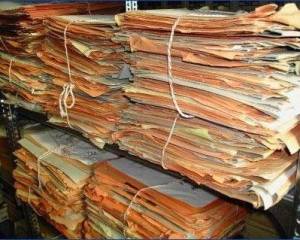New draft law may place post-War archives at threat

The Verkhovna Rada last Tuesday voted on a draft bill on amendments to the Law on the National Archive Fund and Archival Institutions”. The bill was passed in its first reading, with 261 votes out of the 389 registered.
The bill proposes introducing a norm which would ban removal from the archives of confidential documents or material containing secret information for political or ideological reasons, as well as any documents created before 1946.
Director of the National Memorial Museum of Victims of the Occupation Regimes “Tyurma na Lonskoho” in Lviv, Ruslan Zabily explains that at present there are several laws which can be freely used by archive staff. These are the Laws on Information; on Access to Public Information; and the Law on the National Archive Fund and Archival Institutions. He says that their authority needs to be clearly delineated in order to exclude mutually exclusive or contradictory treatment. For example, you have the apparently ban on restricting access to information which is of public significance, while on the other you need special permits to see archival criminal files held in the enforcement bodies’ archives which were not and are not considered secret. Why have such bureaucratic obstacles? There are a lot of such issues which need to be resolved, and real changes, not merely cosmetic, are needed, Mr Zabily says. He adds that it is useless to expect that the present government will show any interest in improving access to the archives.
He also fails to understand what the significance of 1946 is, and says that the draft law would mean that documents created after this arbitrary date could be in threat.
He is concerned about access to archives. “I’ve seen how archives in neighbouring countries work and must note that the level of access to information in them is much better both for researchers and for members of the public. It would therefore be good to bring the legislative base and work of the archives up to European standards, and not think up new norms which make the work of researchers and other interested individuals more difficult”.
Ukrainsky Tyzhden also mentions that the draft law proposes to restrict access to personal files up to 75 years.





